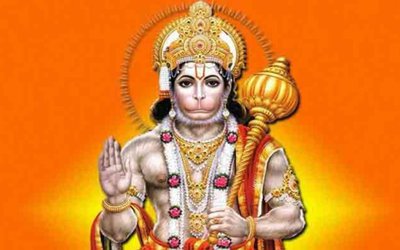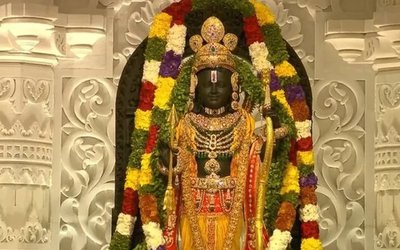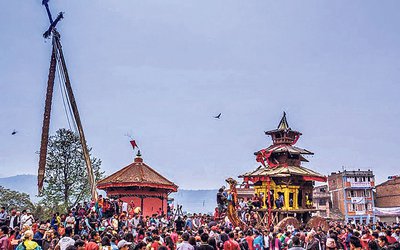
The month Shraravan is very important in Hindu calendar. The month has a special relevance to Lord Shiva and his spouse Goddess Parvati and it is believed that worshipping them in Shravan will help their devotees get salvation or "Moksha".
Today is the first day of Shravan Month popularly known as Shravan Sankrati for people in Nepal and India. Traditionally Nepalese perform puja to protect against skin disease known as Luto (scabies). Also reads
Skin bugs ( parasites) infestation such as the scabies mite, although usually not life-threatening are a significant cause of distress for the patients. Other skin bugs are bedbugs, fleas and lice.
Month of Shiva
The month has a special relevance to Lord Shiva and his spouse Goddess Parvati and it is believed that worshipping them in Shravan will help their devotees get salvation or "Moksha".
Shravan, which is popularly known as "Sawan" or even "Avani" in Tamil Nadu, will finally begin from Monday. The festival has a special relevance to Lord Shiva and his spouse Goddess Parvati and it is believed that worshipping them in Shravan will help their devotees get salvation or "Moksha". To seek Lord Shiva's blessings, people also observe fast and chant special mantras to impress him. In Shravan, many devotees observe fast on every Monday, ‘Sawan Somwar’, in Shravan to seek Lord Shiva’s blessing. Generally, the month of Shravan is observed in July and August. Shrava, which is the fifth month according to the Hindu calendar, will begin from July 6 and continue till August 3.
According to the Hindu calendar, Shravan Maas will begin from July 16 while it will end on August 15. Shravan Maas is considered very auspicious and people across the country observed fast on Mondays and Tuesdays of the holy month.
What are the important dates in Shravan 2020?
According to the Hindu calendar, the important dates of Shravan in 2020 are July 6 of the first Shravan Somwar, July 13 which will be the second Shravan Somwar, July 20 or the third Shravan Somwar, July 27 which will be the fourth Shravan Somwar and August 3 which will be the fifth and last Shravan Somwar. August 3 will also be the last day of the Shravan Maas.
Why is the month of Shravan considered holy and auspicious?
Shravan is considered as one of the holiest auspicious months in the Hindu religion. The Shravan Maas is auspicious for worshipping Lord Shiva, who is also known as ‘Shambhu’, and his wife Goddess Parvati. It is believed that worshipping Lord Shiva on this day will help people get salvation and therefore special prayers are organised in temples to please him.
In the month of Shravan, various other festivals like Naga Panchami, Shravani Purnima, Vara Lakshmi Vrata, Govatsa, Raksha Bandhan, Kalkyavatara, Putradaikadashi and Rishi Panchami are celebrated.
What is the importance of worshipping Lord Shiva in this month?
According to legends, Samudra Manthan – churning of the ocean by the devatas and asura – to get Amrit was started in this month. However, during the process, ‘halahala’ or poison was also churned out which started destroying all kinds of life forms on earth. To stop this, the Gods and the demons prayed to Lord Shiva who then drank that poison and saved the world. Therefore, Lord Shiva is worshipped in the month of Shravan as a gesture of gratitude.
What is the benefit of worshipping Lord Shiva in Shravan?
It is believed that worshipping Lord Shiva on this day will help his devotees seek salvation. However, according to some legends, it is believed that worshipping Lord Shiva on Sawan Maah by unmarried women will help them get a suitable spouse. Therefore, unmarried women observe 16 Somvar vrat on the first Monday of the Shravan month every year to find a suitable and deserving life partner. Thus to worship Lord Shiva on this day, his devotees observe fast and offer milk, water, and bilva leaves to the almighty.
- Qatar And Nepal Ink Several MoUs, Returned Home Completing Two Days Visit
- Apr 24, 2024
- Russia Industrialists Met Prime Minister Dahal
- Apr 24, 2024
- President Paudel Hosts Banquet In Honour Of Visiting Qatari Emir
- Apr 24, 2024
- Weather Forecast: Thunder Showers Is Likely At Few Places Of Koshi, Karnali And Sudur Pashchim
- Apr 24, 2024
- Japan Hands Over The Community Center For Disaster Prevention
- Apr 23, 2024
















